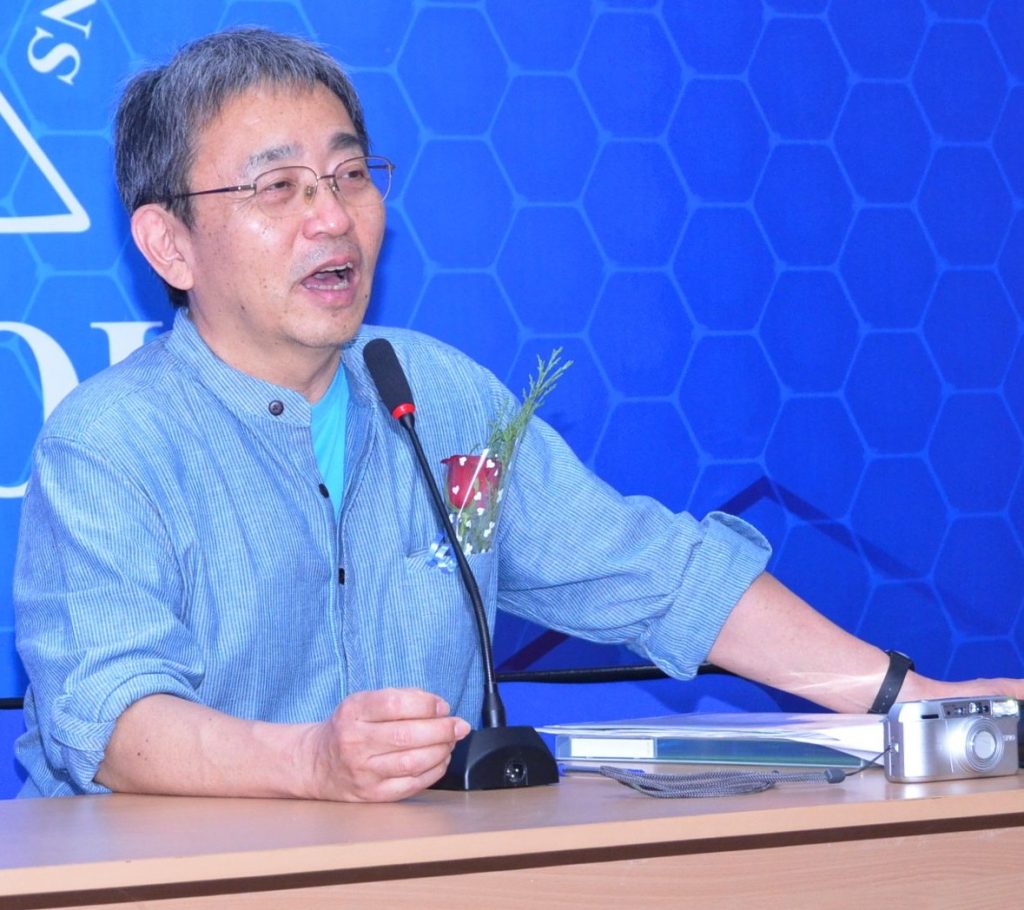Reflecting “Feminism or Death (1974)” a Half Century Later

In a world where environmental issues and sustainable development have become increasingly important, the expertise and insights of individuals like Dr. Kamino are crucial.
Dr. Kamino is a Resource Person at OISCA International, a Japan-based NGO committed to promoting Life on Earth. With a background in social sciences, humanities, and metaphysics, he has spent decades working on issues related to sustainable development and environmental education. His work has been widely published and he has played a key role in facilitating global initiatives aimed at promoting ecological sustainability.
SheSight is delighted to present a series of articles written by this renowned Professor, Dr. Kamino. In this insightful series, Professor Kamino will share his expertise on the concept of ecofeminism and how synthesizing feminism with ecology can lead to a more sustainable future. We are honored to have him share his knowledge and insights with our readers. Through this article series, we hope to provide a platform for meaningful discussions and inspire positive change toward a more equitable and inclusive world.
Here is part-1 of the six-part series from Dr. Yukio Kamino.
Introduction

This chapter reviews Feminism or Death (2022; originally published in French in 1974 as Le féminisme ou la mort) by Françoise d’Eaubonne (1920-2005), analyzes the relevance of its messages to the current world of the 2020s, and draws implications from these reviews and analyses.
Academically, she is known to have had an ‘institutionally autonomous background,’ and perhaps because of that, she emerged as a uniquely creative intellectual and social activist. Another basic point of her career is that she had ‘two faces.’ In their “Introduction to the New French Edition,” Bahaffou and Gorecki (2020/2022) state:
In the 1970s and 1980s, Françoise d’Eaubonne was known to the general French public as a prolific author of poems, biographies, science-fiction novels, and philosophical essays. However, internationally, her reputation was not that of a simple writer: in the anglophone North, she became well known for forging the term “ecofeminism,” which she used for the first time in the final pages of her essay Feminism or Death (p. xx-xxi).
This chapter focuses on the ‘second face’ of d’Eaubonne and intends to be a review article on Feminism or Death (1974/2022). It considers that her greatest contribution, to the entire humanity and Earth System, is synthesizing Ecology and Feminism, which were previously two separate subjects. It also believes that her coining and disseminating the term ‘ecofeminism’ deserves much intellectual recognition. This is especially so as her ‘ecofeminist’ criticisms and warnings delivered in the 1970s are highly relevant to today’s world, which faces grave ecological issues that increasingly threaten the very survival of the human species.

The special significance of Feminism or Death (1974/2022) is illustrated by the simple fact that ‘ecofeminism’—as the school of thought, academic domain, and social movement—not only survived for the past half century but is resurging today, including her own France where her legacy is ‘rediscovered.’ Also, the chapter believes that this is an excellent time to deeply reflect on Feminism or Death, as its long-waited translation into English was just accomplished in 2022.
Readers are invited to explore her legacy together, as the current world is facing multiple crises including the global climate crisis, a variety of military conflicts that are killing not only human rivals but the planetary ecosphere, and the prevalence of infectious diseases (COVID-19 alone killed one million humans in the first 8 months of 2022), which collectively illuminate the need for an urgent and fundamental transformation of human society (United Nations, 2022, August 25).
Yet the more fundamental intellectual contribution by d’Eaubonne was the synthesizing of Feminism, on the one hand, and Ecology or Environmentalism, on the other. Although practically all surveys on the inter-gender difference in the natural environment have shown that females are more concerned with ecological degradations than males, that difference was often overlooked until 1972 when she set up Ecologie- Féminisme (Merchant, 2022, p. ix). As a ‘radical feminist,’ d’Eaubonne reminded her feminist colleagues that their most essential task must be the protection of the ecological integrity of the Earth System because no society can exist if the male-led anthropogenic destruction of nature proceeds further.
While remarking on that point, she confirmed that both female rights and dignities – the traditional concern of feminism – and the preservation of the Earth System required the same strategy: the transfer of power from males to females.
Patriarchy is “a social system in which men have power over women” based on such thoughts that “men are biologically suited to lead, while women were created to serve or follow” and “men have a superior intellect and ability to rationally approach problems” (Erickson-Schroth & Davis, 2021, p. 36). D’Eaubonne articulated that such a mindset and social system had to be abolished without undue delay.
In “Introduction to the New French Edition” to Feminism or Death (1974/2022), Bahaffou and Gorecki (2020/2022) stated: “When each of us held Feminism or Death in our hands, we could not deny that something significant happened…Someone had seriously analyzed the global ecological catastrophe through the lens of gender…The revolution was here. And we had a place in it, we who had long sensed the connection between ecology and feminism…we who were convinced that feminism couldn’t be
limited to ‘equality between men and women’” (p. xxii).
A more concrete and obvious contribution by d’Eaubonne was forging the term ‘ecofeminism,’ which has provided the space where more or less like-minded people could gather albeit with notable diversities in perspective among them. She coined ‘ecofeminism’ in her 1974 essay “Le Temps de L’Ecofeminisme” (The Time of Ecofeminism), and widely disseminated it through the publication of her landmark 1974 book Le féminisme ou la mort (Carroll, 2018, p. 1; Merchant, 2022, p. ix).
That the meaning of ‘ecofeminism’ is interpreted differently among ‘ecofeminists’ is well-recognized as a fact. For instance, a section of work is headlined “Ecofeminist Theories,” thus confirming that ecofeminism’ is not a single vision but refers to multiple visions (Cross, 2018, p. 204). Yet many ecofeminists have looked at such internal diversity positively, not as a sign of confusion but as the intellectual breath from which something highly valuable may emerge. Bahaffou and Gorecki (2020/2022)
concluded:
With this introduction, we have tried to explore the ecofeminist analysis that d’Eaubonne’s Feminism or Death has offered us. She would probably have disapproved of a number of these explorations, but disagreement is inscribed in the DNA of ecofeminism. It’s precisely this tension that renders it so vibrant and that has allowed for the existence of its legitimate children… (pp. xxxvi-xxxvii).
One can add ‘prophecy’ as d’Eaubonne’s contribution of the 1970s as she loudly alarmed the escalation of the ecological devastation that the world is experiencing a half-century later. In the early 1970s, when the peril of the global environmental catastrophe sounded ‘crazy’ to most world citizens, she underlined this possibility even by choosing the term ‘Death’ as a keyword of the title of her book. Unfortunately, her apprehensive forecast has proved to be an exactly legitimate concern by the 2020s. Indeed, Bahaffou
and Gorechi (2020/2022) state “The rediscovery of Françoise d’Eaubonne coincides with the resurgence of ecofeminist movements around the world in response to the climate emergency” (pp. xvii-xviii).
D’Eaubonne’s denunciation of military conflict, especially of nuclear warfare, can also be interpreted as prophetic. At this moment of writing this chapter, the ongoing Russian-Ukraine warfare is widely recognized as the worst war since World War II as its cost has included not only the destruction of humans and their lives directly involved in attacks, but also its negative repercussions involved the ecological, economical, and psycho-cultural repercussions worldwide. This warfare, and many other military confrontations (including conflicts within a nation-state), are practically all led by males and contribute to the acceleration of the destruction of the Earth System. Regarding ecofeminism as an anti-war message, Bahaffou and Gorechi (2020/2022) even explained why they agreed to contribute “Introduction to the New French Edition” as follows: “We write because…we are tired of war, everywhere and all the time” (p. xvii).
In this regard, Bahaffou and Gorechi themselves are also prophetic as they wrote this passage in 2020, two years prior to the Russian invasion of Ukraine. This introduction concludes with a couple of technical reminders. First, if the reader has the experience of translating a written work from Language A to Language B, s/he knows that the process cannot be ‘fully objective’ but requires the insertion of subjective judgments by the translator. Therefore, readers are reminded that Feminism and Death (2022) is not 100 percent the same as d’Eaubonne wished to express in Le féminisme ou la mort. As a way to avoid further and unnecessary distortion of the voices of 1974 original in French, this chapter adopts many direct quotations from Feminism and Death (2022) instead of paraphrasing its text.
Second, in addressing the relevance of 1974 original messages to the 21st century, this chapter seeks to maximize objectivity, credibility, and simplicity by citing only recently published UN News (issued in 2022) as the source of information and widely utilizes direct quotations again. The chapter hopes that, in the end, the readers will be left with positive impressions about this chapter—as a quality review of Feminism and Death, Françoise d’Eaubonne and ecofeminism at large, and of their relevance to the 2020s and beyond.
We hope that this article has provided you with a valuable understanding of ecofeminism and its role in achieving sustainable development. Dr. Kamino’s insights have shed light on the intersectionality of environmental and social justice issues and the importance of addressing them holistically. Join us in this journey of discovering how the synthesis of feminism with ecology can pave the way for a more just and sustainable world. Together, we can take small steps toward building a better future for the planet and its inhabitants.
Dr. Kamino is a graduate of Keio University and studied social sciences, humanities, and metaphysics in the USA. He focuses on sustainable development and environmental education and has authored books on ecological sustainability. He worked as a Senior Researcher and Coordinator at OISCA International until 2019. He now is engaged with them as a Resource Person.









